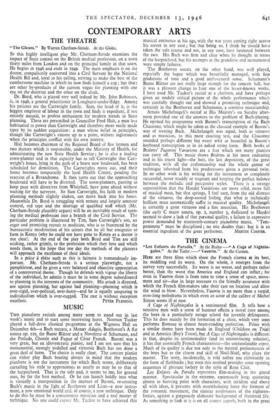MUSIC
Two pianoforte recitals among many seem to stand out in last week's music and to start some interesting hares. Norman Tucker played a full-dress classical programme at the Wigmore Hall on December 6th—a Bach toccata, a Mozart Adagio, Beethoven's A flat sonata op. Ito, the Bunte Blatter and a Novelette of Schumann, and the Prelude, Chorale and Fugue of Cesar Frande. Busoni was a very great, but an idiosyncratic pianist, and I ant not sure that his monumental, strongly pedalled and virtuosic Bach has not done a great deal of harm. The choice is really clear. The concert pianist can either play Bach bearing always in mind that the modern pianforte is not the instrument for which Bach wrote, deliberately curtailing his style to approximate as nearly as may be to that of the harpsichord. That is the safe and, it seems to me, for general uses, by far the best method. Or he can launch boldly into what is virtually a transposition in the manner of Busoni, re-creating Bath's music in the light of Beethoven and Liszt—a new instru- ment, a new emotional world and, of course, a new technique. Only to do this he must be a consummate musician and a real master of technique. No one could expect Mr. Tucker to have achieved this musical eminence at his age, with the war years cutting right across his career in any case ; but that being so, I think he should have taken the safe course and not, in any case, have hesitated between the two. His Bach was firm and clear when he thought in terms of the harpsichord, but his attempts at the grandiose and monumental were simply failures.
The Beethoven sonata on the other hand, was well played, especially the fugue which was beautifully managed, with fine gradations of tone and a good archilectural sense. Schumann's Bunte Blatter are not really large er.ough for the concert hall, but it was a pleasant change to hear one of the lesser-known works. I have used Mr. Tucker's recital as a alatform, and have perhaps given an unduly critical picture of the whole performance which was carefully thought out and showed a promising technique and, certainly in the Beethoven and Schumann, a sensitive musicianship.
Arturo Michelangeli's recital at His Majesty's on Sunday after- noon provided one of the answers to the problem of Bach-playing. He opened his programme with Busoni's transcription of the Bach Chaconne, which might be taken as the classical example of Busoni's way of treating Bach. Michelangeli was equal, both as virtuoso and as musician, to this most exacting test, and the Chaconne sounded perhaps different but every whit as beautiful in Busoni's keyboard transcription as in its naked string form. Both books of Brahms' Paganini Variations are a feat which not many pianists can carry off. This music shows Brahms at his most endearing and in his truest light—the heir, the last depository, of the great tradition, with all the craftsmanship and the whole gamut of technique inherited from his predecessors given a personal twist. In no other work is his writing for the instrument so completely successful, never muddy or stagnant and keeping the perfect balance between the melodic and percussive styles. There is a strange superstitition that the Handel Variations are more solid, more full of musical meat, but that springs, I feel sure, from the old distrust of the virtuoso, the deep-rooted feeling that what is technically brilliant must automatically suffer in musical quality. Michelangeli is certainly a great virtuoso and a fine musician. His Beethoven (the early C major sonata, op. 2, number 3, dedicated to Haydn) seemed to show a lack of that personal quality, a failure in expressive power demanded by nineteenth-century pianoforte music. "Tem- perament " must be disciplined ; no one doubts that: but it is an essential ingredient of the great performer. MARTIN COOPER.


































 Previous page
Previous page